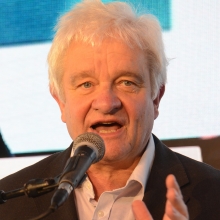Toward a treatment for Huntington’s disease
Weizmann scientists have discovered two small molecules that can reverse the effects of this incurable neurodegenerative disorder
Briefs

Prof. Rivka Dikstein and her research team in the Department of Biomolecular Sciences have identified two molecules that can penetrate the blood-brain barrier and delay the onset and progression of Huntington’s disease by selectively inhibiting the expression of the mutated gene driving the disease. The new drugs even reverse some symptoms. Their findings represent an important step forward for patients and their families.
Huntington’s disease is an inherited disorder affecting an estimated 5-10 out of 100,000 people worldwide, primarily people of European ancestry.
The disease is caused by a mutation in one of the copies of the huntingtin gene, which encodes the recipe for producing the huntingtin protein. This defect is caused by the expansion of an already repeating set of instructions—a region of the DNA containing cytosine, adenine, and guanine (CAG). That is, CAG repeats of 36 or fewer is normal, while an extension of >40 guarantees the occurrence of disease during the person’s lifetime; the middle ground is less predictable. The more excess repeats, the earlier the onset of the disease and the more severe the symptoms. Thus, lowering the mutant huntingtin levels is the most promising therapeutic strategy.
Although the huntingtin protein is produced throughout the body, it is particularly concentrated in the brain. The defective, misshapen huntingtin has a substantial, negative impact on brain function, and the pathological behavior of this defective protein leads to neuronal cell death, especially in areas that control movement and emotion.
Prof. Dikstein has spent years investigating a protein called Spt5 that helps regulate transcription from DNA into RNA, a crucial stage in protein production. Spt5 is particularly important for promoting the transcription of the mutant huntingtin gene over the transcription of the normal version.
A glimmer of hope emerged in 2019. Dr. Anat Bahat, a staff scientist in the Dikstein group, found several small molecules that can inhibit certain functions of Spt5 without causing significant damage to the protein’s other vital functions. The researchers then found three small molecules that specifically inhibited the expression of mutant huntingtin without harming the expression of normal huntingtin and other proteins linked to inflammation.
In the new study, published earlier this year in EMBO Molecular Medicine, Dr. Bahat and the team used mouse models of the disease to identify the two most effective molecules and then tested them in human patients’ cells—revealing a significant drop in the amount of the mutant protein, with no decrease in the healthy protein.
The researchers then tested the two selected molecules in mice genetically modified to carry a human version of the mutant huntingtin gene, infusing the molecules directly into the damaged part of the brain over four weeks. The treatment reduced the expression of the mutant copy of the gene and increased the proportion of the relevant healthy proteins in the damaged area of the brain. The treatment also managed to alleviate the damage caused by the disease. Subsequently, the drugs were proven to be effective against Huntington’s disease even when given by subcutaneous injection, with no apparent toxicity or side effects.
In the final part of the groundbreaking study, the researchers examined the effects of the treatment when administered orally to the mice over two months, from an early stage when the first signs of the disease had only just begun to appear—e.g., anxiety, hyperactivity, and loss of balance. The new drugs not only lessened existing symptoms but also delayed disease progress.
“These molecules could pave the way for an effective and safe treatment of Huntington’s disease,” says Prof. Dikstein. “In recent years, it’s become clear that a certain function of large regulatory proteins can be precisely targeted using small molecules without harming the overall functioning of these proteins. This understanding could lay the foundations for new treatments for a variety of diseases.”
RIVKA DIKSTEIN IS SUPPORTED BY:
- Y. Leon Benoziyo Institute for Molecular Medicine
- Joel and Mady Dukler Fund for Cancer Research
- Dr. Erhard, Emmi and Fred Loewinsohn Center for Pediatric Health
- Dr. Barry Sherman Institute for Medicinal Chemistry
- Ruth and Leonard Simon Professorial Chair of Cancer Research








